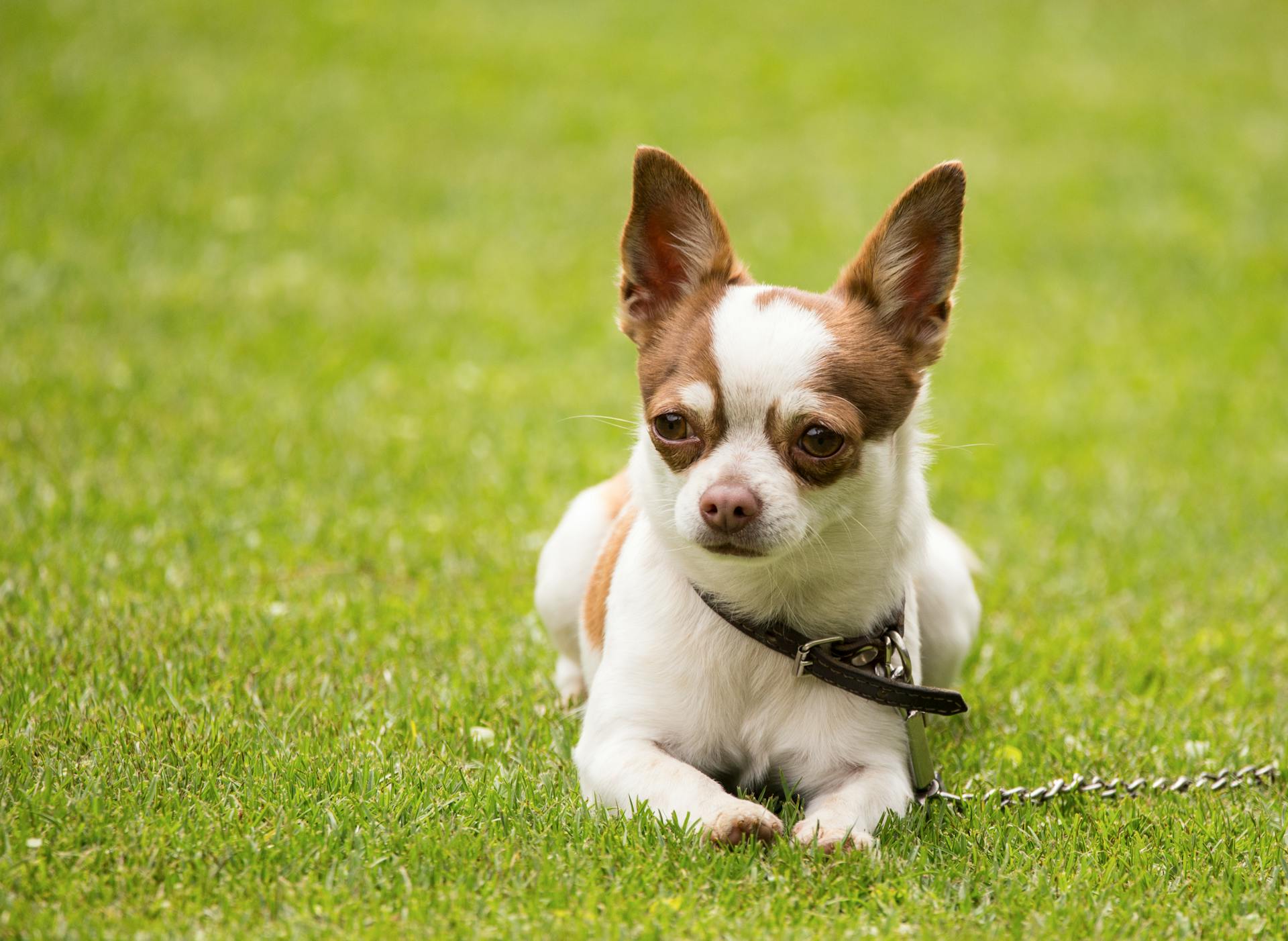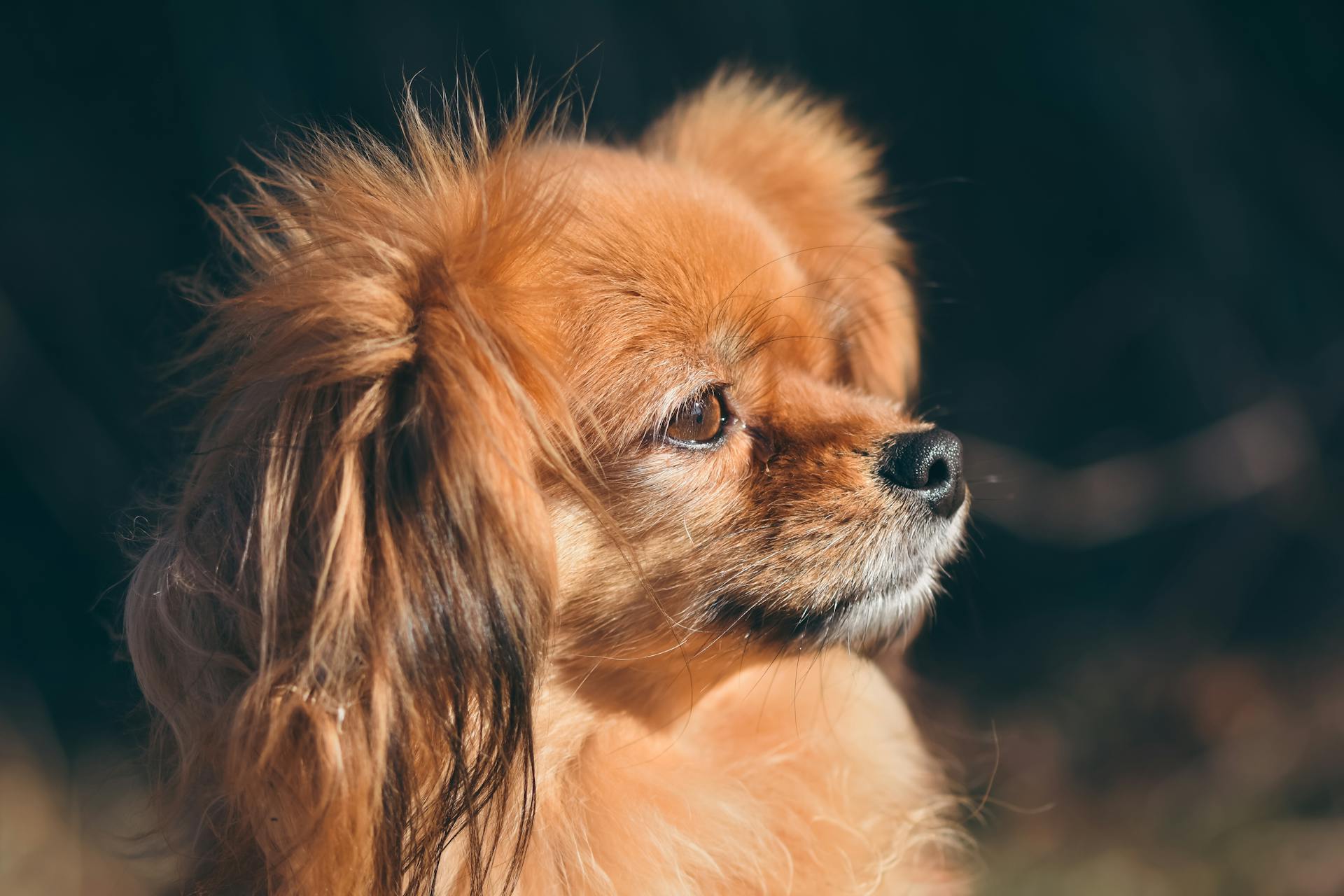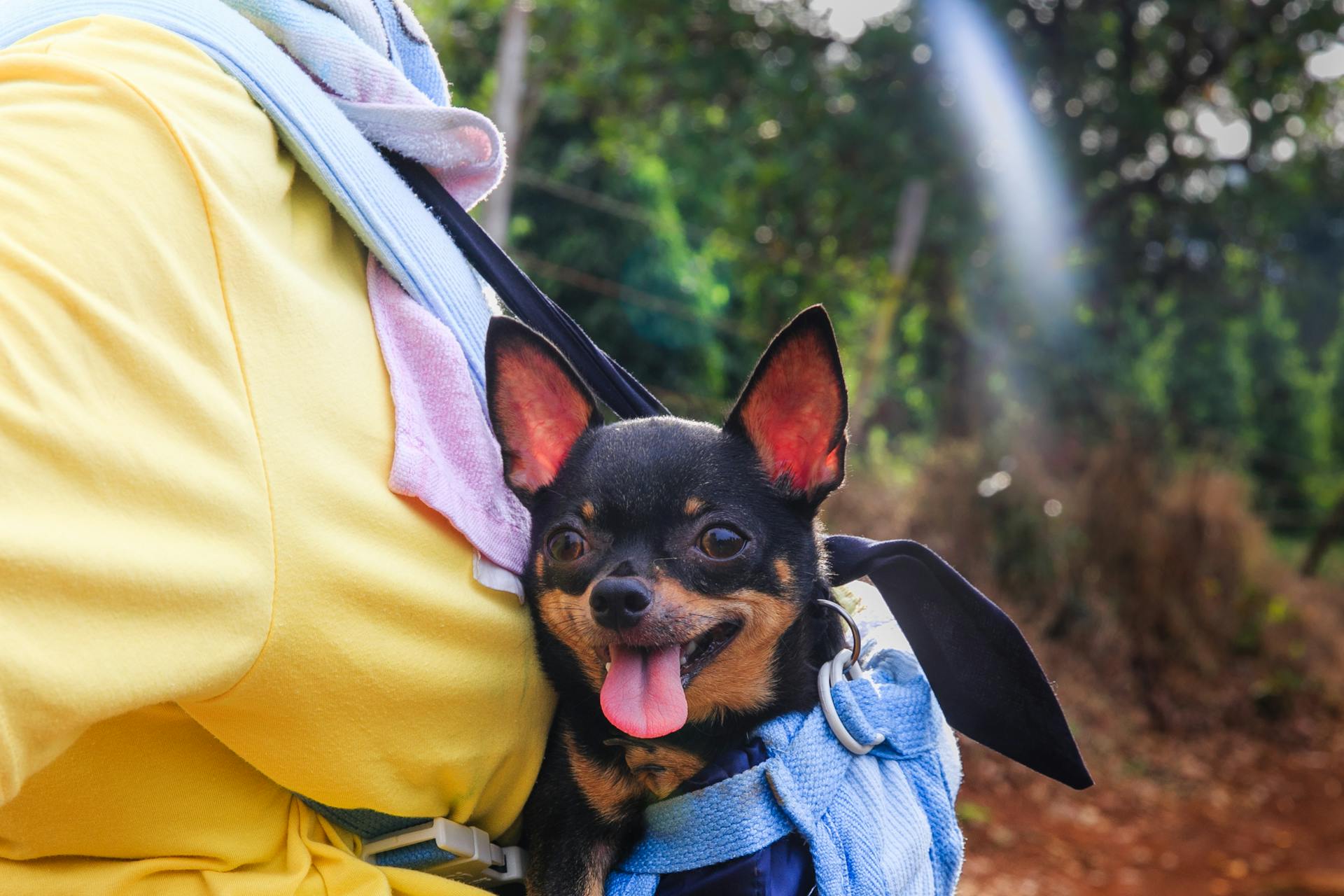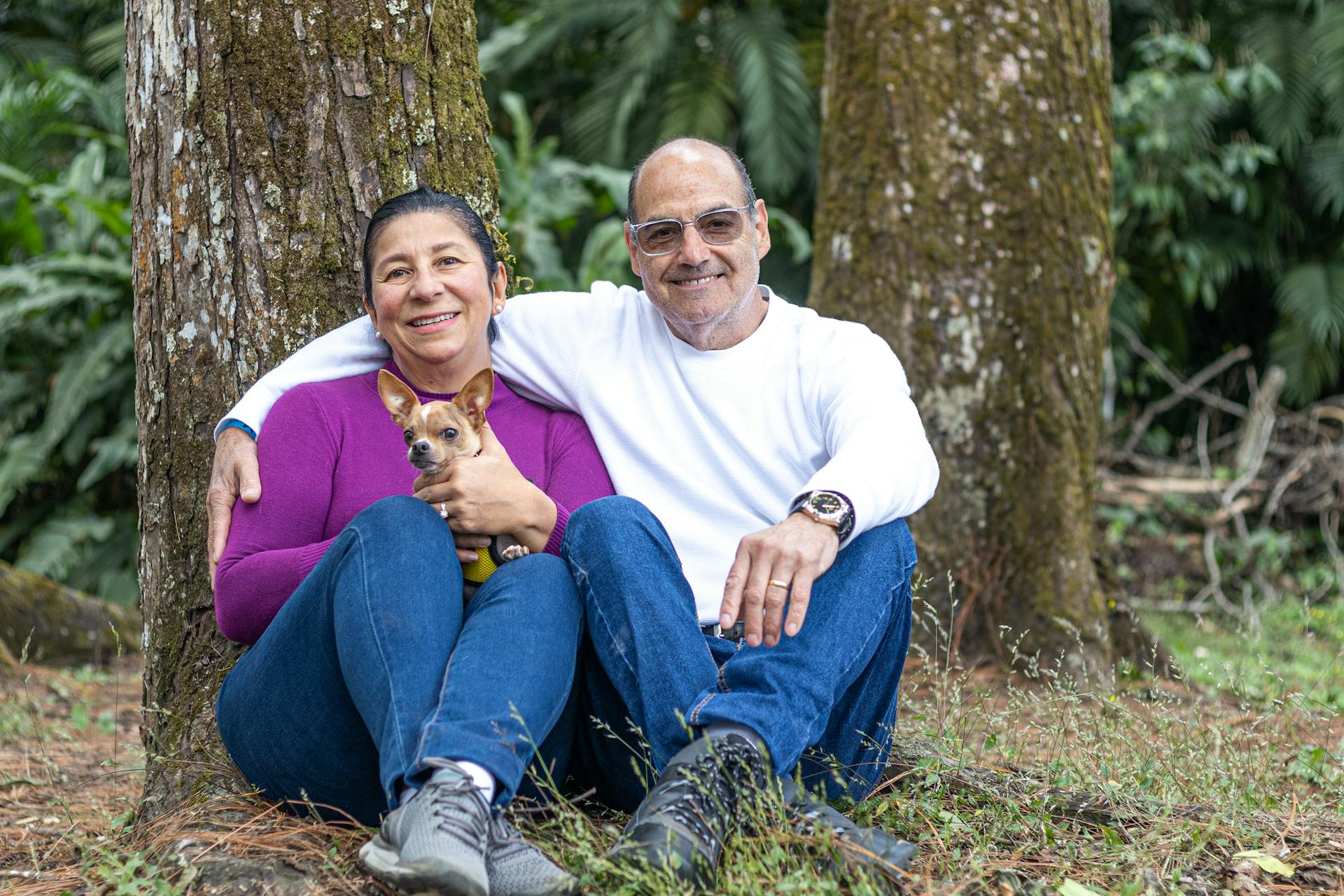
Chihuahuas are prone to hypoglycemia, a condition where their blood sugar levels drop too low, especially if they haven't eaten for several hours.
They need to eat frequently to maintain their energy levels, so it's essential to feed them 3-4 times a day.
Chihuahuas are also susceptible to heart problems, including patent ductus arteriosus, a condition where the blood vessel connecting the heart to the lungs doesn't close properly.
This can lead to heart failure and other complications if left untreated.
Breed-Specific Health Concerns
Chihuahuas are more at risk than other dogs for certain health issues due to their breed. They can be prone to injury around the house, especially from larger creatures and moving objects.
Their tiny size puts them at greater risk of injury, so careful supervision is necessary. Owners should check blankets and stray clothing before plopping down, and keep an eye on children, larger dogs, new people, and loose large objects.
Dental issues are also common in Chihuahuas, including overcrowding of teeth and subsequent dental issues like malocclusions and periodontal disease.
Chihuahuas can be prone to overcrowding of teeth due to their small size, which can lead to dental issues. Regular brushing and veterinary check-ups can help prevent these problems.
Epilepsy is a neurological hereditary condition that can cause seizures in Chihuahuas. They are generally not painful, but may need to be treated with medication.
Chihuahuas with epilepsy can often live long, happy lives with proper treatment. However, it's essential to work with a veterinarian to develop a plan for managing seizures.
Tracheal collapse is a condition that affects Chihuahuas, causing difficulty breathing and sometimes a "goose honk" coughing sound. It's not fully understood, but Chihuahuas are at a congenital risk for it, especially as they age.
Heart disease is also a concern for Chihuahuas, particularly heart valve issues like mitral valve disease, which can cause heart failure later in life. Patent ductus arteriosus, a heart deformity, is also common in this breed.
Related reading: Dog Food for Dogs with No Teeth
Knee problems, such as patellar luxation, can affect Chihuahuas, causing frequent dislocations and potentially leading to arthritis. Regular check-ups and maintaining a healthy weight can help prevent these issues.
Pregnancy complications are common in Chihuahuas due to their relatively large head and narrow pelvis. C-sections are often necessary to protect both the mother and her puppies.
Here are some key breed-specific health concerns to watch out for in Chihuahuas:
- Injury around the house
- Dental issues (overcrowding, malocclusions, periodontal disease)
- Epilepsy (seizures)
- Tracheal collapse (difficulty breathing)
- Heart disease (mitral valve disease, patent ductus arteriosus)
- Knee problems (patellar luxation)
- Pregnancy complications (C-sections)
Health and Wellness
Small dogs like Chihuahuas are prone to certain health issues due to their genetic predisposition.
Their tiny size puts them at a higher risk of injury from larger objects or people, so it's essential to supervise them closely, especially around children and other pets.
Chihuahuas can be prone to dental issues, including overcrowding of teeth and subsequent problems like malocclusions and periodontal disease.
Epilepsy, a neurological condition, can cause seizures in Chihuahuas, but it's often manageable with medication.
Tracheal collapse is another condition Chihuahuas are at risk for, which can cause breathing difficulties and a distinctive cough.
Heart disease is also common in Chihuahuas, particularly mitral valve disease, which can lead to heart failure later in life.
Knee problems, such as patellar luxation, are another issue Chihuahuas may face, which can cause dislocations and arthritis.
To keep your Chihuahua healthy, it's crucial to maintain a consistent diet, avoid giving them people food, and ensure they get regular exercise.
Here are some general health tips for Chihuahuas:
- Brush their coat at least weekly to prevent mats and keep it shiny.
- Clean their ears weekly to prevent infections.
- Brush their teeth at least twice a week to keep them healthy.
- Provide a warm winter wardrobe to protect them from the cold.
- Exercise them regularly, but avoid overexertion.
Eye and Respiratory Issues
Chihuahuas are prone to eye problems that can significantly impact their quality of life. Eye conditions like glaucoma, dry eye, and cataracts can cause blindness if left untreated, and most are extremely painful for your dog.
Glaucoma is a medical emergency that requires immediate attention. If you notice symptoms such as squinting, watery eyes, bluing of the cornea, and redness in the whites of the eyes, don't wait to call your vet – go to an emergency clinic right away.
Dry eye, or KCS, is common in Chihuahuas and can lead to sore, itchy eyes and infections. Symptoms include a dull, dry appearance or thick discharge from the eyes, squinting, and pawing at the eyes. If you notice any of these signs, call your vet immediately.
Cataracts are a common cause of blindness in older Chihuahuas, but many dogs adjust well to losing their vision and get along just fine. Surgery to remove cataracts and restore sight may also be an option.
Eye Problems
Eye problems can have a dramatic impact on your dog's quality of life. Unfortunately, Chihuahuas are prone to various eye conditions that can be extremely painful and even lead to blindness if left untreated.
Glaucoma is a medical emergency that rapidly leads to blindness if left untreated. Symptoms include squinting, watery eyes, bluing of the cornea, and redness in the whites of the eyes.
Glaucoma is extremely painful, but pain is rarely noticed by pet owners. In advanced cases, the eye may look enlarged or swollen like it's bulging. If you see symptoms, don't wait to call your vet, go to an emergency clinic!
Dry eye, also known as keratoconjunctivitis sicca or KCS, is common in Chihuahuas. KCS reduces the amount of fluid produced by the tear glands, resulting in sore, itchy eyes and infections.
Symptoms of KCS include a dull, dry appearance or thick discharge from the eyes, squinting, and pawing at the eyes. If you notice any of these signs, call your vet immediately and they'll conduct a tear test on your pet.
Cataracts are a common cause of blindness in older Chihuahuas. The lenses of their eyes become more opaque, looking cloudy instead of clear.
Many dogs adjust well to losing their vision and get along just fine. Surgery to remove cataracts and restore sight may also be an option.
Here are some common eye problems in Chihuahuas:
- Glaucoma: a medical emergency that rapidly leads to blindness if left untreated.
- Dry eye (KCS): a painful condition that reduces the amount of fluid produced by the tear glands.
- Cataracts: a common cause of blindness in older Chihuahuas.
Tracheal Collapse
Tracheal Collapse is a common issue that can affect Chihuahuas. The trachea, or windpipe, is made up of rings of cartilage that provide flexibility and strength.
These cartilage rings are sometimes weak or incorrectly formed in Chihuahuas, leading to tracheal collapse. This can cause the trachea to become too narrow, leading to coughing or difficulty breathing.
Most cases of tracheal collapse are mild and can be treated symptomatically with medication. Symptoms can be managed with medication, but in severe cases, surgery may be recommended.
Dental and Allergy Issues
Chihuahuas often have skin allergies, known as atopy, which make their skin itchy. The feet, belly, folds of the skin, and ears are most commonly affected.
Symptoms of atopy in Chihuahuas typically start between the ages of one and three and can get worse every year. Licking the paws, rubbing the face, and frequent ear infections are common signs of allergies.
Retained puppy teeth are common in small breeds like Chihuahuas, and can cause infection, damage to adult teeth, and painful gums.
Retained Puppy Teeth
Dogs normally begin to lose their primary ("puppy") teeth at around 4 months of age. Retained puppy teeth can crowd the incoming adult teeth and trap food and hair between the teeth causing cavities and infections.
If the primary teeth don't fall out as the adult teeth come in, infection or damage to the adult teeth may occur. Retained teeth are common in small breeds like Chihuahuas.
Painful gums, bad breath, and adult tooth loss can result if retained puppy teeth are left untreated. We'll monitor your pet's growing teeth at each exam and discuss removal of any retained puppy teeth with you when indicated.
Allergies
Allergies can be a real nuisance for our furry friends, especially Chihuahuas, who often suffer from a skin allergy called atopy.
Symptoms of atopy in dogs typically start between the ages of one and three and can get worse every year.
The feet, belly, folds of the skin, and ears are most commonly affected by this skin allergy.
Licking the paws, rubbing the face, and frequent ear infections are the most common signs of allergies in dogs.
The good news is that there are many treatment options available for these conditions, so if you suspect your dog has allergies, don't hesitate to consult with your veterinarian.
Care and Exercise
Caring for your Chihuahua is a big responsibility, but with a little common sense and attention to detail, you can keep your furry friend happy and healthy. Much of what you can do to keep your dog happy and healthy is common sense, just like it is for people.
Brushing your Chihuahua's coat at least weekly will help prevent mats and keep her coat shiny. Regular dental care is also essential, so brush her teeth at least twice a week to keep them perfect. Don't forget to clean her ears weekly, even as a puppy.
Here are some key care and exercise tips for your Chihuahua:
- Feed a high-quality diet appropriate for her age.
- Keep your dog's diet consistent and don’t give her people food.
- Exercise your dog regularly, but don’t overdo it at first.
- Chihuahuas are sensitive to cold, so a warm winter wardrobe is necessary.
- She will need a daily walk and regular inside play.
Remember, every dog is different, so be sure to tailor your care and exercise routine to your Chihuahua's unique needs and personality.
Care and Exercise
Caring for your Chihuahua's diet is crucial for her overall health. A high-quality diet appropriate for her age is essential.
Chihuahuas are prone to overeating, so it's essential to keep their diet consistent and not give them people food. This will help prevent obesity and related health issues.

Regular exercise is also vital for your Chihuahua's physical and mental well-being. You should exercise your dog regularly, but don't overdo it at first.
Here are some exercise guidelines to keep in mind:
Chihuahuas are sensitive to cold, so a warm winter wardrobe is necessary. This includes keeping them indoors when it's cold outside.
Cleaning your Chihuahua's ears weekly is also essential, even as a puppy. Don't worry, you'll learn how to do it properly.
Brushing your Chihuahua's coat regularly is also important. Brushing at least weekly will prevent mats and keep her coat shiny.
Preparing Your Dog for Halloween Costumes
To prepare your dog for Halloween costumes, start by introducing them to the costume gradually.
Don't spook your pooch on Halloween! Here's how to ease them into their costume. Introduce the costume a few days before Halloween, and let your dog sniff and explore it at their own pace.
Begin with short sessions, so your dog doesn't get overwhelmed. Gradually increase the time spent with the costume over the next few days.
You can even try dressing your dog in a simple bandana or scarf first, to get them used to wearing something on their neck or body.
Nutrition and Lifestyle
Small dogs like Chihuahuas need precise nutrition to stay healthy.
Very small fluctuations in meal size can have a huge impact on a Chihuahua's weight, contributing to a higher risk of serious health conditions.
Excess weight can aggravate knee problems that Chihuahuas are prone to.
A Chihuahua's daily calorie needs are minimal, possibly just 200 calories, depending on their size and activity level.
Treats can really add up and contribute to weight gain and nutritional imbalance in a tiny dog.
For your interest: Australian Silky Terrier Weight
Healthy Lifestyles
Eating a balanced diet is key to maintaining a healthy lifestyle. A diet rich in fruits, vegetables, whole grains, and lean proteins can help prevent chronic diseases like heart disease, diabetes, and certain cancers.
Aim to include at least five servings of fruits and vegetables in your diet every day. Fruits and vegetables are packed with vitamins, minerals, and antioxidants that help protect your body from damage.
Regular physical activity is also essential for a healthy lifestyle. The American Heart Association recommends at least 150 minutes of moderate-intensity aerobic activity or 75 minutes of vigorous-intensity aerobic activity per week.
Exercise not only helps maintain a healthy weight but also improves mental health and reduces the risk of chronic diseases.
For more insights, see: Small Dog Diseases
Nutrition
Nutrition plays a huge role in a Chihuahua's overall health, and very small fluctuations in meal size can have a huge impact on their weight. Obesity in dogs contributes to a higher risk of many serious health conditions, and it doesn't take much excess weight to trigger health issues.
Chihuahuas are prone to knee problems, and excess weight can aggravate these issues. It's essential to determine the precise number of daily calories they need and keep track of their weight and body condition.
A Chihuahua's daily calorie intake is minimal, possibly just 200 calories, depending on their size and activity level. Their meals may look tiny to us, but that's actually the right amount for their tiny bodies.
Treats can really add up and contribute to weight gain and nutritional imbalance in a Chihuahua. It's crucial to keep an extra close eye on treats and make sure they're not overdoing it.
A fresh food plan tailored to your Chihuahua's age, size, activity level, and weight can take the guesswork out of portion management and ensure they're getting all the necessary nutrients in the right balance.
Recommended read: Tiny Puppys
General Information
Chihuahuas can weigh anywhere from two to eight pounds, although six pounds is the typical upper limit.
They come in both short-haired and long-haired varieties, with a range of coat colors.
Big, luminous eyes and large, erect ears, also known as bat ears, are a distinctive feature of the breed.
Chihuahuas are relatively low-maintenance when it comes to grooming, and they tend to be very clean pets overall.
However, they do require regular training and care to be happy and well-adjusted, just like any other dog.
Additional reading: Breeds of Dogs under 40 Pounds
General Health Information
As a Chihuahua owner, it's essential to understand the general health information that applies to all canines. Regular veterinary check-ups are crucial to ensure your Chi stays healthy.
Chihuahuas are prone to health issues related to their breed, so being aware of these risks can help you take proactive steps in prevention. A balanced diet and regular exercise are vital for maintaining your Chi's overall health.
For another approach, see: Chi Apso

Brushing your Chi's coat at least weekly can prevent mats and keep their coat shiny. This simple habit can make a big difference in their appearance and overall well-being.
Chihuahuas are sensitive to cold, so dressing them in warm clothing during winter is necessary. This may seem like a small thing, but it can make a big difference in their comfort and health.
Here are some general health tips for Chihuahuas:
- Keep your dog's diet consistent and avoid giving them people food.
- Feed a high-quality diet appropriate for your Chi's age.
- Exercise your dog regularly, but don't overdo it at first.
By following these simple tips, you can help your Chi live a long, happy, and healthy life. Remember, every dog is different, so it's essential to work closely with your veterinarian to develop a personalized care plan for your furry friend.
Basic Breed Facts
Chihuahuas can weigh from just two to eight pounds, though they typically top out at six pounds.
Chihuahuas stand from about five to nine inches tall.
They can be short-haired or long-haired, with a range of coat colors.
For your interest: Breeds of Dogs under 25 Pounds
Chihuahuas have big, luminous eyes and large, erect ears, known as bat ears.
They typically don’t require a lot of grooming and tend to be very clean pets.
Chihuahuas can live longer than average lives, with a lifespan that can reach 14 and even up to 18 years.
People often underestimate the care and training Chihuahuas need, thinking they're low-maintenance due to their small size.
Chihuahuas require just as much care and training as a larger dog.
Adopting a Chihuahua mixed breed can be a good option, as they tend to be more easygoing and have fewer health issues.
Discover more: Small Dog Training
Breed History
The Chihuahua breed has a rich history that spans thousands of years and originates from Mexico.
Studies support a native Mexican origin for the breed, tracing back to pre-Colombian civilizations that make up present-day Mexico.
Artifacts depicting Chihuahua-like dogs have been found at various archaeological sites.
Some historians believe Chihuahuas are descendants of the Techichi, a dog breed raised by the ancient Mesoamerican Toltec civilization.
Consider reading: Chihuahua Dogs in Mexico
The Aztecs may have raised Chihuahuas as food, as suggested by Spanish explorer Hernán Cortés in a 1520 letter to King Charles V.
The number of Chihuahuas declined after the Spanish conquest of the Aztecs.
In the 1800s, Americans began to take an interest in the breed, leading to a revival of the Chihuahua population.
The American Kennel Club officially recognized the Chihuahua breed in 1904.
Chihuahuas have remained among the most popular breeds since the mid-century trend of urbanization, when people sought out dogs that could thrive in smaller spaces.
Chihuahua Personality
Chihuahuas are described as "terrier-like", which gives a clue to their typical disposition. They often have charmingly outsized temperaments that can range from opinionated and bossy to sweet and cuddly.
Their loyalty is a key attribute, making them protective of their humans and suspicious of strangers. This can make them surprisingly effective watchdogs.
Chihuahuas are known to be pretty dramatic, and they can be emotional. They tend to be very loving to those they are close to.
Some owners describe their Chihuahuas as stubborn and bossy, while others see them as sassy and scrappy. Whatever their personality, one thing is for sure: Chihuahuas are loyal to their core.
Frequently Asked Questions
Is a Chihuahua a good family dog?
Chihuahuas can make great family pets, but they require respectful treatment and may not be suitable for households with young children or frequent strangers
What breed of Chihuahua stays small?
The apple-domed Chihuahua is the breed that typically stays small, weighing up to six pounds and standing 5-8 inches tall. This variety is the only one that fits the breed standard.
Are Chihuahuas high maintenance?
No, Chihuahuas are considered a low-maintenance dog breed, requiring minimal space and exercise. They are also known for being one of the cleanest dog breeds, making them a great choice for busy owners.
What is the lifespan of a mini Chihuahua?
A mini Chihuahua's lifespan typically ranges from 7 to 12 years, depending on care and health. With proper care, some mini Chihuahuas can live longer than that.
Sources
- https://www.ctvsh.com/services/dogs/breeds/chihuahua
- https://www.vidavetcare.com/dog-breed/chihuahua/
- https://www.thefarmersdog.com/digest/chihuahua-care-guide-food-exercise-personality/
- https://www.dogbreedslist.info/all-dog-breeds/chihuahua.html
- https://www.goodhousekeeping.com/life/pets/advice/g1754/small-dog-breeds/
Featured Images: pexels.com


